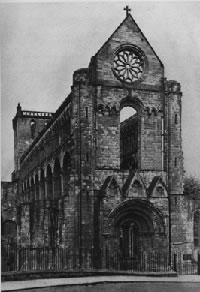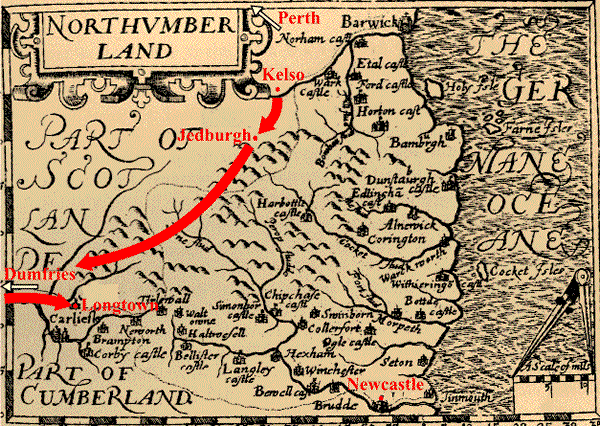The Jacobites Divided
The combined Jacobite army was now a fairly impressive force which considerably outnumbered the Government troops in the area, even with Carpenter's reinforcements. There were 600 horse and 1,400 foot assembled at Kelso. Many of the men were well armed, and the force contained some experienced and capable soldiers.
Unfortunately, however, most of the senior command had little or no military knowledge. In particular, Lord Kenmure and Thomas Forster were weak links. For the moment, Mackintosh was in command, but as soon as the army crossed into England, Mar's instructions made it clear that Forster would be in charge. The leaders immediately began to argue about the best course to take. Derwentwater, perhaps influenced by his brother, favoured taking the bull by the horns and attacking Carpenter's smaller army in North Northumberland. Forster favoured outflanking Carpenter's army and stealing a march on an undefended Newcastle. Mackintosh and the Highlanders wanted to turn north and trap Argyll's army between themselves and Mar's forces at Perth. Kenmure and the Lowlanders still favoured attacking Dumfries and establishing it as a Jacobite capital in the Lowlands. Lord Wintoun wanted to take Dumfries and then march to join Mar's army in the Highlands, if possible avoiding battle on the way.
The leaders immediately began to argue about the best course to take. Derwentwater, perhaps influenced by his brother, favoured taking the bull by the horns and attacking Carpenter's smaller army in North Northumberland. Forster favoured outflanking Carpenter's army and stealing a march on an undefended Newcastle. Mackintosh and the Highlanders wanted to turn north and trap Argyll's army between themselves and Mar's forces at Perth. Kenmure and the Lowlanders still favoured attacking Dumfries and establishing it as a Jacobite capital in the Lowlands. Lord Wintoun wanted to take Dumfries and then march to join Mar's army in the Highlands, if possible avoiding battle on the way.
All of these strategies had something to recommend them, and each one would have a good chance of success. The problem was that each group of Jacobites had their own agenda and their own aims. Mar had failed to provide sufficient instructions as to the overall strategy and they had not heard from him for some time. The Highlanders made it quite clear they had no interest in fighting in England and threatened to desert. Instead of adopting a single strategy and sticking to it, the Jacobites prevaricated. First, they marched to Jedburgh, giving Carpenter the impression they intended to outflank him and march on Newcastle. Then they marched along the Border to Dumfries. When Carpenter crossed into Scotland, the Highlanders immediately suggested they turn back and attack him. On 31 October another council of war was held near Longtown. Before a decision could be made, a messenger brought letters purporting to be from the Lancashire Catholics, saying that they were ready to rise and bring in 20,000 men. It was announced that 1,000 were already in arms. Patten, however, suggests that this letter was fabricated by the English leaders in order to persuade the reluctant army to march into England.
Instead of adopting a single strategy and sticking to it, the Jacobites prevaricated. First, they marched to Jedburgh, giving Carpenter the impression they intended to outflank him and march on Newcastle. Then they marched along the Border to Dumfries. When Carpenter crossed into Scotland, the Highlanders immediately suggested they turn back and attack him. On 31 October another council of war was held near Longtown. Before a decision could be made, a messenger brought letters purporting to be from the Lancashire Catholics, saying that they were ready to rise and bring in 20,000 men. It was announced that 1,000 were already in arms. Patten, however, suggests that this letter was fabricated by the English leaders in order to persuade the reluctant army to march into England.
Faced with this extraordinary news, the Jacobite High Command decided, with some misgivings, to march towards Lancashire. There were also high hopes of support from the Cumbrian Jacobites. The Highlanders were so disgusted by the march into England that 500 of them immediately deserted, never to return.
